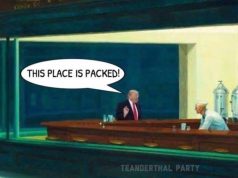 Marquel, TPVs NYTimes Legal Eagles Section correspondent was recently being interviewed about the demise of print when he read, in print, Lawyer Not Entitled to See Classified Surveillance Material, Court Rules. A federal appeals court said that the government need not show a defense lawyer classified materials related to the surveillance of a client, reversing a groundbreaking ruling by a lower court.
Marquel, TPVs NYTimes Legal Eagles Section correspondent was recently being interviewed about the demise of print when he read, in print, Lawyer Not Entitled to See Classified Surveillance Material, Court Rules. A federal appeals court said that the government need not show a defense lawyer classified materials related to the surveillance of a client, reversing a groundbreaking ruling by a lower court.
In order to see if a warrant was legal, everyone agrees, the defense has a right to see whether the information it is based upon was legally obtained. Yet in dozens of terrorism trials the federal government has refused to yield that information. Instead of the obvious which would be to quash the warrant for lack of government cooperation and compliance with plain federal law, every court has refused to order the government to comply and also refused to dismiss the case. The courts have effectively licensed the government to violate the law since evidence of violations is in the government’s custody and the courts have refused to order them to disclose it.
A federal trial judge recently broke that pattern and ordered the government to give that information to the defendants lawyer, who had security clearances. Today the federal appeals court reversed that ruling, giving the government a perfect record for avoiding penalties when breaking the law.
The appeals court, through judge Eric Posner, an esteemed but right wing jurist, said that the court didn’t need to see the information because it could (magically) figure out the facts itself. Without the adversary process, said the judge, the very heart of our judicial system.
Marquel thought this was strange. He read the judges’ opinions. They agreed the defendant couldn’t get a fair hearing. But they offered the legal equivalent of “tough nuggies: blah blah blah blah blah appeal dismissed.
I had to go down to Washington and find someone, anyone, who could make even the weakest defense of this decision. I had one contact at the supreme court, a young clerk. I called him up to ask if he knew anyone at all at the intermediate appellate level where Judge Posner sits.
“I know a janitor there,” he said, “a guard, all the people in the lunchroom, and the husband of a woman who conducts tours of the building.”
It wasn’t a promising pool to choose from. I asked, “is the janitor a man or woman?”
“Man,” he answered, “why?”
I ignored his question. “Do you think he cleans the bathrooms?”
“Of course,” he said, “why?”
“I’ll take him,” I said.
I took my third Acela trip of the month. It was very fast all the way to Washington. Then it crept for an hour into the station. I was able to watch the regular Amtrak train arrive and leave before we reached our platform.
I found the janitor at the courthouse. He told me his lunch break would arrive at noon and we could go talk then. Noon arrived. So did the janitor. I explained I wanted to know what kind of reasoning went into this latest decision. Did he ever hear conversations while cleaning up, or while doing the bathrooms, between clerks, clerks and judges, judges? It turned out he was a fountain of information. He heard a little bit of everything, and claimed he could put together the rest.
“Do you understand the legal principles involved in this case?” I asked.
“Of course, do you?” he asked.
“Well, it’s my job,” I explained, “I have to understand, even if I have to force myself to read that drivel. But what’s your legal background?”
“I’m a part time law student at American University Law School,” he said. “I fully understand FISA and Franks hearings, and everything. I’ve got all the required courses finished, and I read law constantly.”
“Fair enough,” I said. “To tell the truth, I’d accept your word on things if you’d never been to grammar school. These courts have information just tied up.”
“Yeah, and they’re supposed to be our courts,” he said.
“That’s the attitude,” I said, to encourage him. I thought I might have a live one here. I knew FISA (the Foreign Intelligence Surveillance Act), too, and I knew all about Franks hearings, which are what they call hearings designed to see if a warrant is based on illegal conduct.
“So,” I started, “tell me. What made Posner think a court could figure out whether a warrant was good without an adversary hearing?”
“He doesn’t,” said the janitor, “I heard him in the bathroom admit it. He said ‘without cross examination there’s no way in the world anybody could know whether the affidavit was filled with lies.”
“So he just made it up to support the opinion?” I asked.
“Well, what do you think?” he asked. “If you had a warrant, and nothing else except for the government documents about what happened, how would you know what it said was first of all true, and secondly, obtained without violating the law?”
“Don’t know,” I said. “What do you think?”
“Well, if you didn’t need a hearing, why do they grant hearings in all other cases?” he asked rhetorically. “It’s only when the defense lawyer, knowing what his client has told him, information that nobody else could possibly have, can cross examine whoever made up the warrant affidavit, and catch him in the lie. Otherwise it’s impossible.”
“And what about the fact that this lawyer had a Top Secret security clearance?” I asked. “Posner said it was too risky because he could have a Snowden type of leakage. How could he cite Snowden without admitting that we all now know that the government lies about everything in the world?”
He shrugged his shoulders. “You know,” he said, “smart judges are just smart enough to say stupid things. Did you know that the closed hearing, where all the secret evidence is told to the judge in a hearing where nobody is allowed to be present, is all recorded by a court reporter? The reporter types it all up, of course, and he also has a Top Secret clearance. But most of the court reporters I know are drunkards or are social misfits. Talk about the chances of a leak. I don’t know what’s going through these judges heads.”
“Well, that’s what I want to know. What’s going through Posner’s head?” I asked.
“A gentle breeze when they leave the courthouse doors open.” he said.
“That’s funny,” I said.
“Thanks,” he said. “I do stand up Saturday nights in town. Would you like to come?”
“I can’t stay in town that long. Do you ever do New York?”
“Couple of times a year.” he said.
“Then let me know. I’ll be in the audience.” This is great, I thought. A janitor who does stand up. That’s my Deep Throat. If this becomes a movie it’ll be called the Comic Who Cleans Up or something. I thought of Woodward and Bernstein. Would they have used a comic who cleans up? I got myself together, wiped my tears, and asked, “So why is Posner so opposed to disclosure?”
“Well,” he said, “I’ve often wondered about that. He really believes the government. When he has to sign a search warrant, he never reads it. He’s sure the cops tell the truth.”
“Then it’s ironic,” I said, “that he mentioned Snowden as a reason for refusing a hearing. Does he really know what Snowden revealed?”
“Well, he really hates Snowden and calls him a traitor.” he said.
“Even though Snowden was the only way the public learned of the massive government lawbreaking and lies?” I asked.
“Well, he hardly seems to know that. All he knows is that Snowden broke the law by revealing secret information.” he answered.
“Does he know that Martin Luther King broke the law too?” I asked.
“I think he thinks King was a criminal too. Anybody who gets arrested is a crook, and therefore can’t be believed.”
“Well, Snowden wasn’t arrested.” I said.
“Good point,” he said. But I wanted him to make the points, not me.
“Okay, so the judge believes everything the government says, thinks all lawbreakers are the same, doesn’t realize that a court reporter is a worse intelligence threat than a lawyer with a Top Secret security clearance. Is he skeptical about nothing?”
“He’s skeptical that I know how to clean.” my janitor said.
“Really?” I asked.
“He’s always cleaning up after I finish. Frankly, I think he’s nuts.” he said.
“But what else can you tell me about this case?” I asked.
“Hmm,” he muttered, “the other judges don’t like him much.”
“Really?” I asked. “Why?”
“You know that hammer, the gavel, that sits on the bench?” he asked.
“Of course,” I said.
“Well, he always grabs it. Even when another judge already has it, he grabs it out of the other’s hands. I’ve actually heard the other judges whine that he never gives them the chance to hold the gavel.”
“Apparently,” I said, “that’s the sort of thing that’s important to judges.
“Definitely,” he said, “and justice be damned.”
And justice be damned. That’s a good movie title, I thought. Wow. With a little luck, I might make it. And Justice Be Damned, starring…hmm….who would it star? I spent my return trip on the Acela imagining all sorts of choices, the entire cast, the Oscar ceremony, the best screenplay award, and I even had time to sketch out a movie review I could then write in the Pothole Review about it. Because the Acela was four hours late.
***
BY MARQUEL: And Justice Be Damned














Amazing!!! Marquel, you’re fantastic. Your humor. Your humanity. Your understanding of all these thorny issues NYT only publishes. Fantastic! Thank you, Man!
Wow! and Eric Posner is one of our brightest! Or perhaps not!
Marvelous. Perfect. Like always.
I would like to say that this is terrifying. I read the NY Times article and they did not make it clear at all. But this is terrifying. Judges should not play with our democratic institutions. Not to destroy them. That is not their role. Their role in to solve disputes, and they seem to have forgotten that.
Carmen, you said it so beautifully all I can add is “ditto”
Excellent!
And Justice Be Damned, starring George Clooney, unless he’s busy.
FYI. All nuggies are tough, take it from someone who’s been under the knuckle and don’t get me started on weggies.